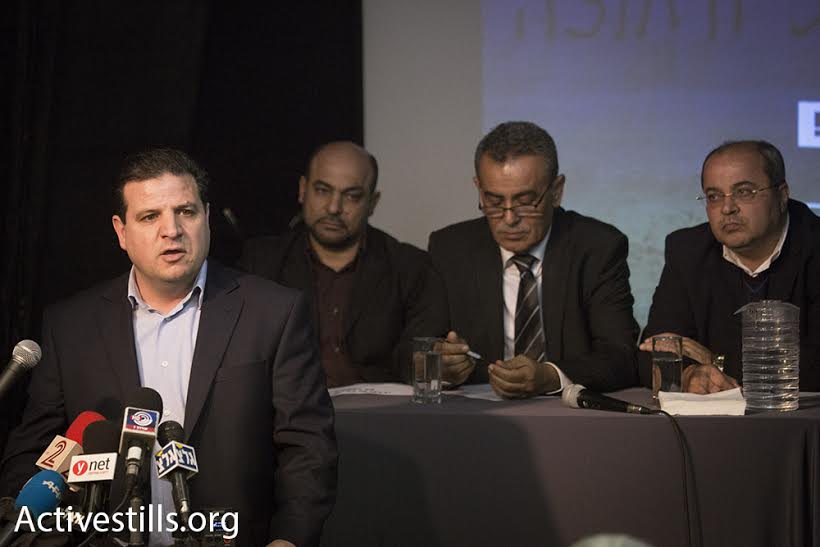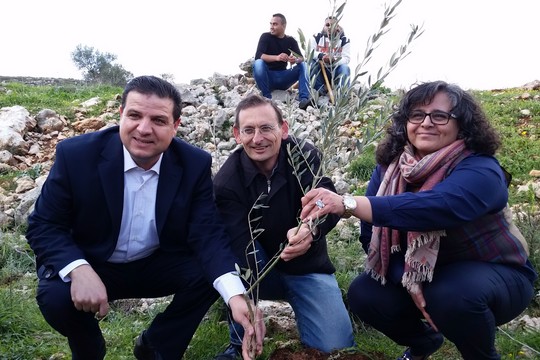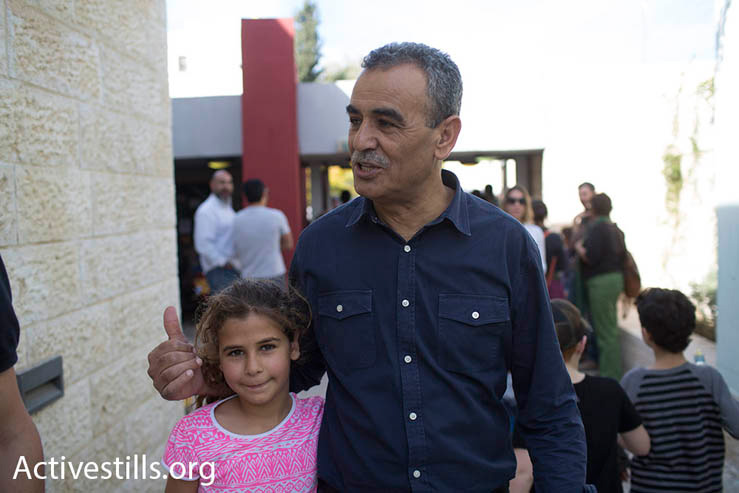As an oppressed and colonized minority, we will only ever achieve real change in Israeli policy when we behave as a coherent national group. This does not, however, mean we are excluding our Jewish allies.
By Awad Abdelfattah

The true strategic significance of the creation of the Joint Arab List has eluded most Israelis. Even among Arab Palestinians inside Israel, the common assumption is that the List’s sole objective is to surmount the electoral threshold after it was raised to 3.25 percent by Avigdor Lieberman’s Yisrael Beiteinu party, thereby increasing the influence of the Arab minority in Israeli politics.
This is undoubtedly a major aim — but it is not the most important one. Rather, the formation of the Joint List finally puts the Arab parties on a shared path towards the much-delayed goal of re-organizing our community.
The unification of the Arab parties came late, but the idea has been under discussion for many years. It was first proposed by the Balad party back in 1999 and is consistent with our platform that the Palestinian minority must be organized on a national basis.
The pressure on the political parties from the Arab public to unite had been mounting in recent years. The Palestinian minority has faced ever greater hostility as well as an escalation in racist legislation and incitement from the State. As the Arab members of Knesset became more marginalized, Palestinian citizens’ loss of faith in the political game grew. More and more of them chose to stay at home on election day, either out of indifference or because they actively boycotted Knesset elections. Now that the Arab parties have responded, the Arab public will expect to see this cooperation not only sustained in the Knesset and on the ground, but expanded.
Communist concerns
In the 2012 elections, the Communist Party (Hadash, a joint Arab-Jewish list) was the only one of the four Arab parties in the Knesset to object to the idea of unification. It argued that unity would alienate Israeli Jews and would lead to increased retaliation from the establishment. But a deeper reason for Hadash’s objection stemmed from its time-honored reliance on a Stalinist approach that espouses internationalism as a way to degrade nationalism. Some observers noted the contradiction in the Communist Party’s position, since it acknowledged Israel as the state of the Jewish people immediately after 1948, and its membership cards were titled “The Communist Party of Israeli Patriots.”

Moreover, the Hadash leadership always maintained it could not enter an electoral pact with the two other major parties, the Islamic Movement and Balad, because it identified as both a secular as well as an Arab-Jewish party. It also argued that such unification would present an image of Arab citizens as separatists, antagonizing Israeli Jews and the State. Instead Hadash preferred an integrationist approach, advocating Arab-Jewish cooperation based on communist principles rather than adopting liberal democratic values. The party advocated equality and rights for the Palestinian minority without specifying what form such rights should take.
This approach hit a crisis in the 1980s and 1990s as the Soviet Union crumbled. Both liberal-democratic values and the collective rights discourse entrenched with European charters in 1992 and 1995 safeguarding national minority rights became the order of the day.
Balad’s different discourse
Balad, meanwhile, advanced a different political discourse after it was established in the mid-1990s, immediately after the Oslo Accords were signed. The Accords left the matter of the Palestinian minority’s rights in Israel unresolved. We called for full citizenship and recognition of our national identity. Equal citizenship, in our view, bound a democracy to its citizens. We argued that no equality could be achieved as long as Israel was a Jewish state. As for the question of national identity, we argued that full citizenship was not possible unless the Palestinian minority was allowed the right to administer its cultural affairs.

Our demand that Palestinians in Israel have a right to self-determination was based on contemporary democratic political theory and drew on the experiences of national and ethnic minorities in modern Western states, such as the Quebecois in Canada, the German-speaking minority of the South Tyrol region in northern Italy, and others. Making such demands did not necessarily entail campaigning for a separate state, nor for an absolute autonomy based on either demographic or geographic criteria. Rather it required a minimum form of cultural autonomy, which entitles a community to organize on a national basis. Such minorities expect their own national institutions and elected leadership — or a higher council. This is the only way they can preserve their national identity and their historic narrative, and have some control over their development as a national minority.
In our case, this form of national organization would be a vital defense against Israeli policies designed to divide and fragment us into small sectarian, tribal and ethnic minorities. For example, the Palestinian Druze community has been cut off from the Palestinian people culturally since the 1950s, when it was forced to serve in the Israeli army.
Changing dynamics
The formation of the Joint List is likely to mark a radical change in perceptions within the Arab parties, and particularly within Hadash, regarding how we relate to the Zionist regime. Hadash has consistently opposed rebuilding the deeply flawed and unrepresentative Higher Arab Monitoring Committee (an independent political organization whose aim is to coordinate the political actions of various Arab groups in Israel) as a truly representative national body, supported by a locally-financed national fund financed. It is still far from clear that Hadash is ready to consider this step. But in finally joining a predominantly Arab electoral list, it has forsaken a major long-cherished tenet — namely, its rejection of organizing the Palestinian minority.
I have been closely involved in the debate among the senior Arab leadership on this issue for the past 15 years. In that time it has only grown clearer to me that, as an oppressed and colonized minority, we will only ever achieve real change in Israeli policy when we behave as a coherent national group.
Those on the Zionist left, focused exclusively on ending Netanyahu’s rule, perceive the role of the Joint List in terms of effecting a change in the balance between the right-wing parties and the Zionist Camp. Given the current reality, in which polls show there will be no such change at this election, the more significant role of the List should be viewed in terms of empowering the Palestinian minority from within.
I very much hope that the unprecedented success of the Arab parties in uniting will open the way for further strategic steps, especially rebuilding the Higher Arab Monitoring Committee. If we obtain as many as 15 seats, such a reconstruction would greatly improve the balance of power.
This would not be a separatist step. The Joint List has not turned its back on Israeli society. To ensure the Arab parties preserve an avenue to Israeli Jewish society, the List has highlighted its platform’s democratic components, both in its declared principles and in having a democratic Israeli Jew among the first ten seats.
The Joint List is the only truly democratic party running in these Israeli elections. It advocates full equality for all citizens, in national and civil rights. It calls for an end to the colonial, apartheid regime in the 1967 territories, and it believes that consolidating our own unity can strengthen the Palestinian struggle in ways that help our brethren in the West Bank, Gaza and those in exile.
The List is driving home the message to the Israeli public that Palestinians in Israel will never renounce their right to full equality. Proper citizenship is achievable for the Palestinian minority but only when the colonial and racist structure of Israel’s version of apartheid is dismantled.
Awad Abdelfattah is the secretary-general of Balad, one of four Arab parties in the Joint List.

